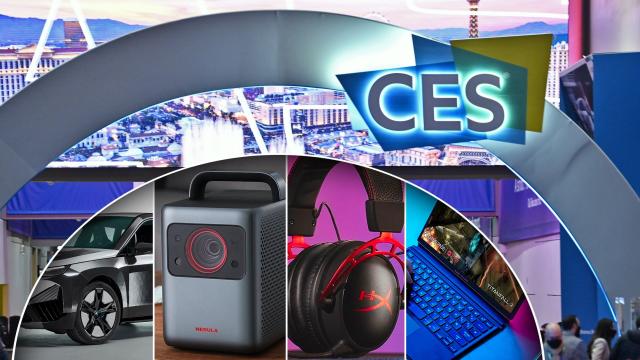CES 2022 was expected to be the technology industry’s first big hurrah post-pandemic, and while the Omicron variant made some of the largest companies and most of the press (including Gizmodo) back out of in-person attendance, there was still a lot to see.
We haven’t gotten to see these gadgets up close and personal yet, but despite the virtual reveals, we were still impressed with what’s to come this year. Get ready for ambitious and powerful laptops, more impressive TVs, and incredibly cool cars — plus some smaller, plainly useful gadgets that will make this weird world a little easier to navigate.
Here are the best gadgets we saw at CES 2022.
BMW iX Flow
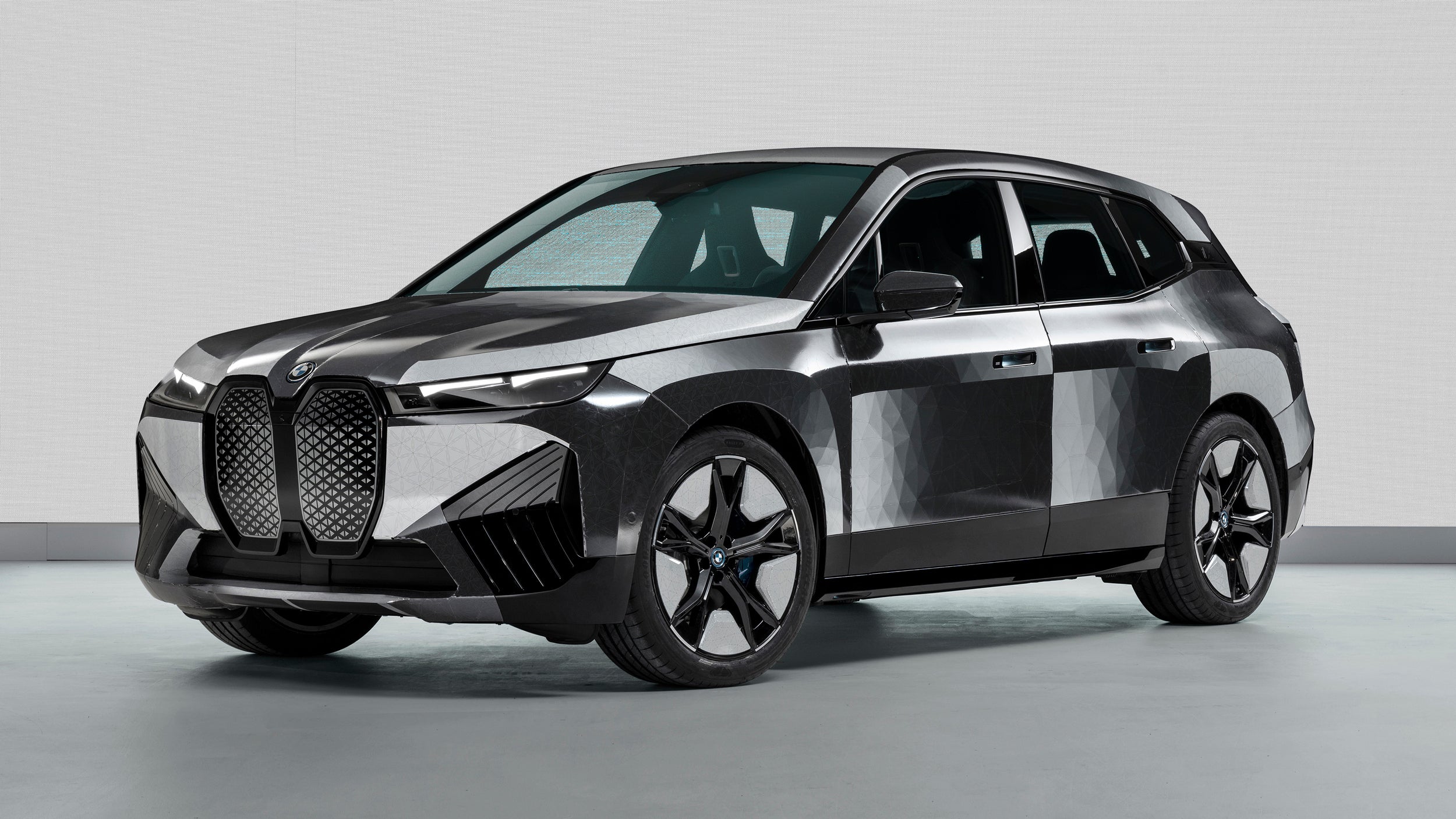
It looks like the ultimate spy gadget cooked up by Q in a James Bond film: At CES 2022, BMW showcased the world’s first colour-changing car — although some will dispute the “colour” claim given the modified BMW iX Flow can only switch from solid black to white and back again, or display complex monochromatic patterns at the push of a button. Instead of developing a radical new paint technology, BMW turned to a well-known display technology that’s been in use for decades in devices like e-readers. The upgraded BMW iX Flow is wrapped in a complex skin of electronic paper panels, courtesy of E Ink.
The car represents a radical new application of E Ink’s technology, and while some may see it as the ultimate getaway vehicle by instantly modifying its appearance, there are some practical (and more legal) applications to a colour-changing car. If you’ve ever climbed into a black vehicle on a hot summer’s day, you know it can quickly become like an oven in there. Imagine being able to instantly switch your vehicle’s exterior to white on a hot day to reflect the sun’s rays away instead. BMW has no plans to make a colour-changing exterior an official option on new vehicles just yet, but it’s a design concept that many would be eager to embrace. — Andrew Liszewski
Asus Zenbook 17 Fold OLED
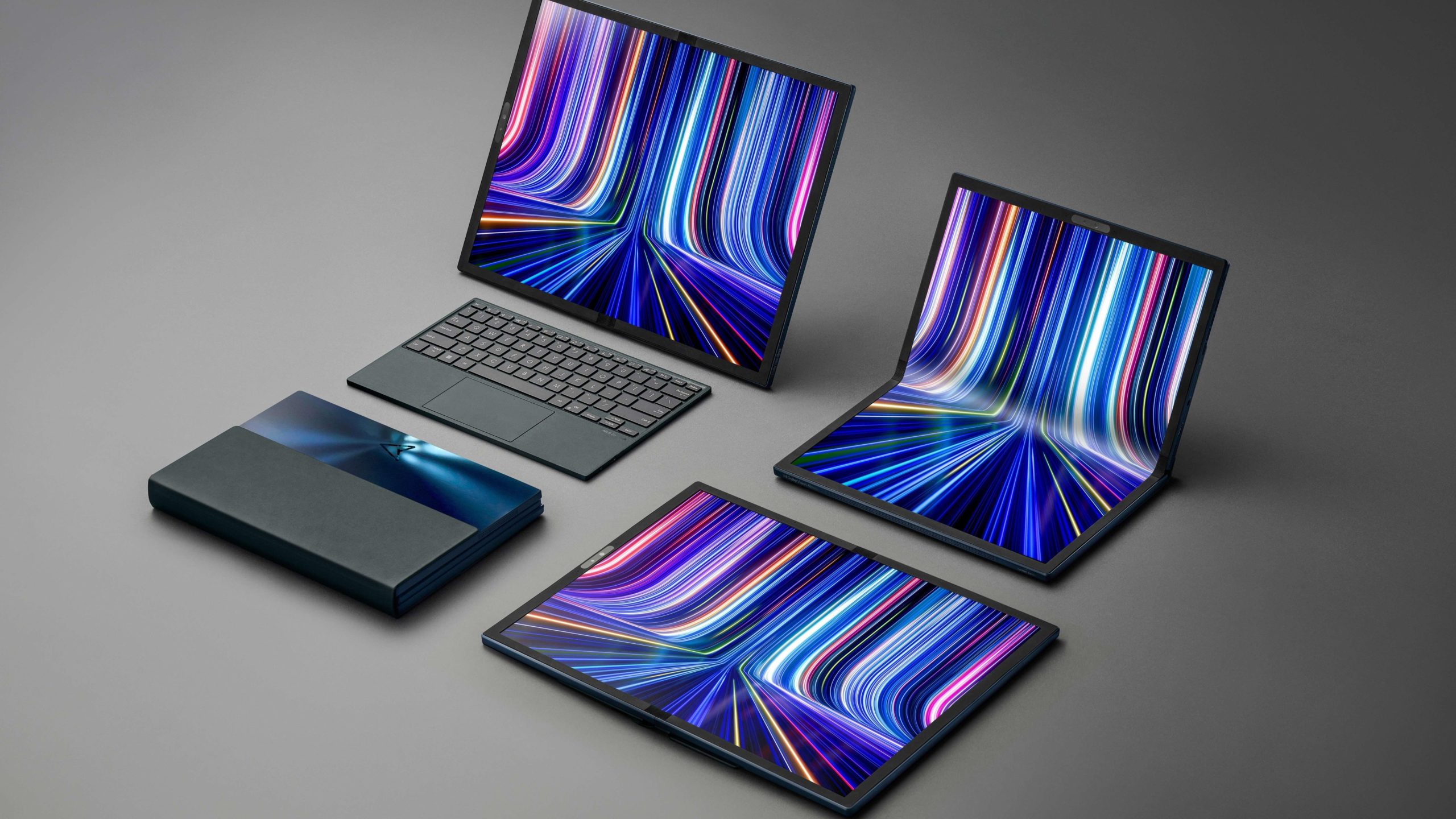
We don’t know what led Asus to build an oversized foldable PC, but the bonkers Zenbook 17 Fold OLED is arguably the most memorable device we saw at CES 2022. The world’s first foldable PC with a 17-inch display (and maybe the last), the ZenBook is essentially a gigantic convertible tablet that can fold in half when you need to slip it into a bag.
Besides portability, the benefit of using a folding display is that it allows for various modes. You can fold one panel 90 degrees and use the tablet as a traditional laptop with either the on-screen keyboard or an included detachable one. Or you can open the screen flat and use the kickstand on the back to prop the tablet upright when you’re watching movies on its 17.3-inch, 2.5K (2560 x 1920) OLED touchscreen. Included “ScreenXpert 2” software helps with moving windows around as you move from one mode to the next.
This probably won’t end up being one of the “best” products announced at CES, but it sure is one of the most far-out. And yes, “nobody asked for this” but that’s precisely why it landed on this list. Because, if the Zenbook 17 Fold OLED proves anything, it’s that Asus doesn’t give any fucks — something we can all relate to two years into a global pandemic. So go on Asus, keep making your strange gadgets, so long as they don’t replace the good stuff. — Phillip Tracy
Samsung Freestyle
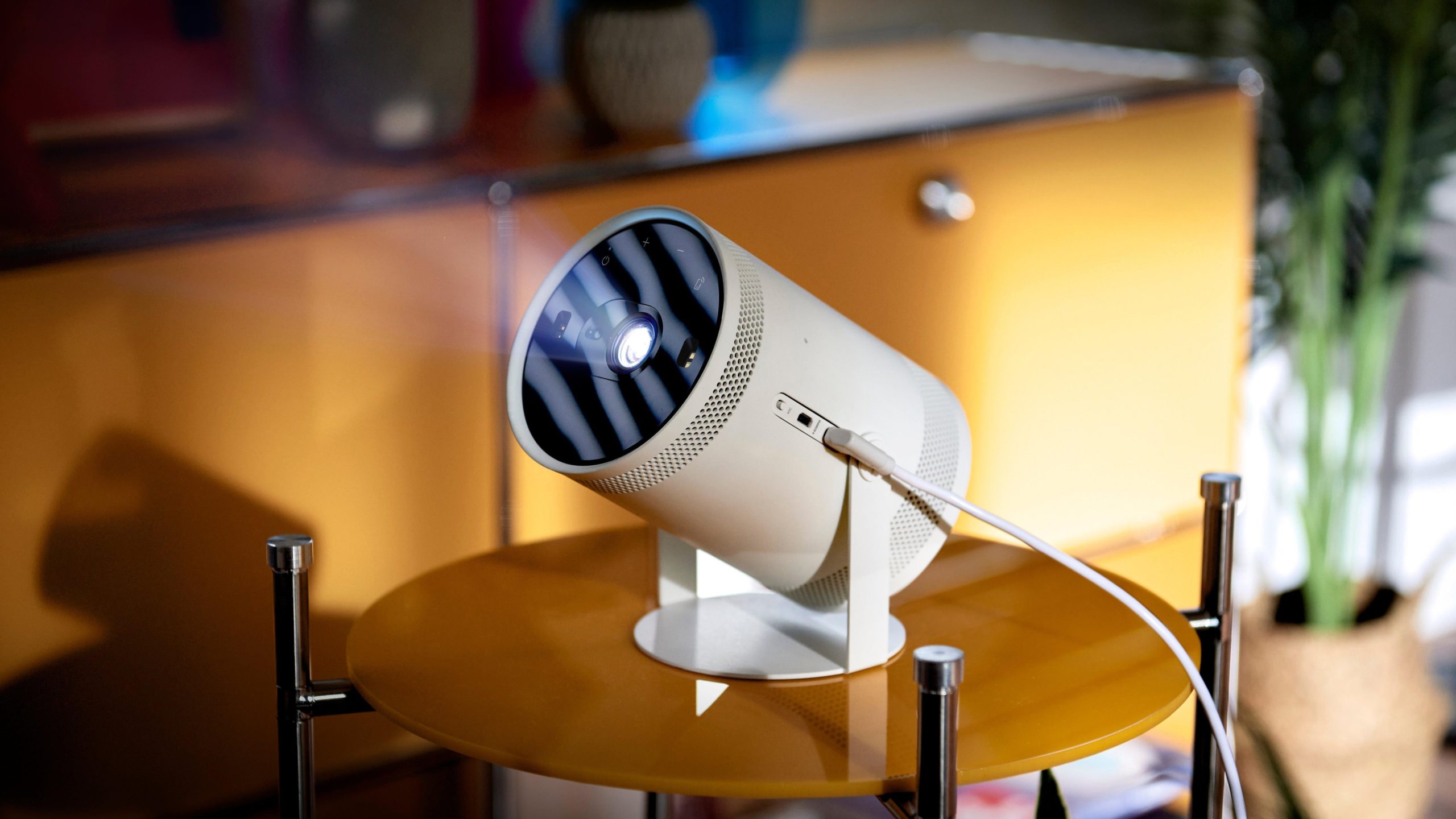
The new Freestyle by Samsung — an ultra-cute, ultra-portable projector that you can tote around with you on camping trips or use to take your next pillow fort up several notches — earns its spot as one of the coolest new products we saw at CES this year if only because of how perfectly suited it is for millennials and Gen Z.
To be clear, at $US900 ($1,257), the Freestyle isn’t exactly being marketed as a much cheaper alternative to a TV. But it does make the perfect device for a transient generation that might benefit from a sub-2 pound device that can effectively project a screen anywhere from 30 inches to 100 inches onto almost any flat surface imaginable, and also comes equipped with a full 1080p HDR-capable view and 360-degree audio built in. — Brianna Provenzano
Sony QD-OLED TV
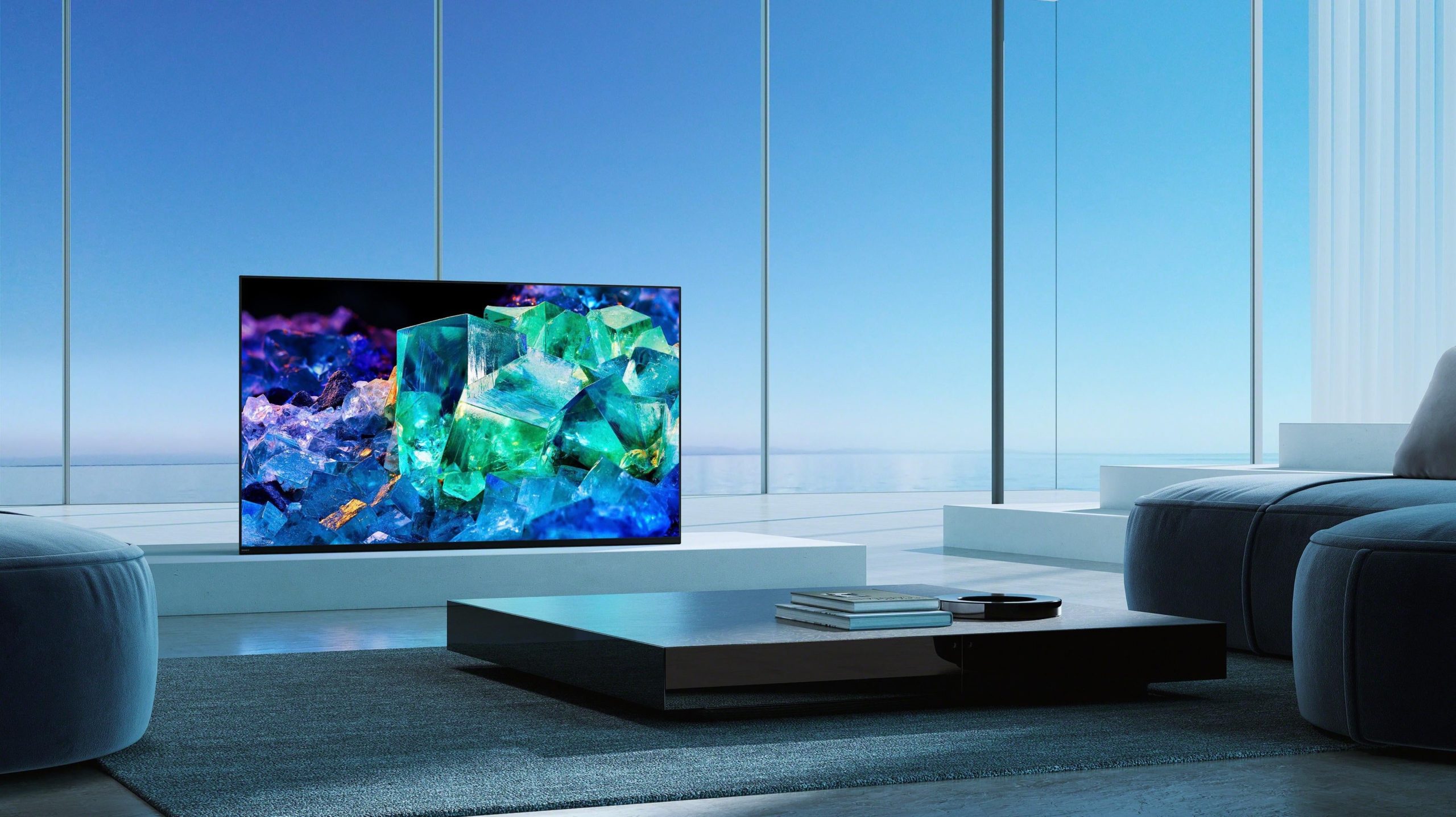
One of the most buzzed-about products at CES this year was Sony’s new QD-OLED TV, which, like the name suggests, is more or less a juiced-up version of OLED. Samsung Display is responsible for pioneering the QD-OLED panels, short for quantum dot organic light-emitting diode, and claims that the technology is good at combining the impressive deep blacks of traditional OLED with more vivid colours and more impressive brightness. The viewing angles are also supposedly superior, thanks to the quantum dot technology that also works to emit light more uniformly.
Unlike standard OLED technology, QD-OLED only uses blue light-emitting diodes, which in turn allow the panel to successfully produce the full spectrum of colours that the human eye is able to perceive. Although we (regrettably) didn’t get to check out Sony’s QD-OLED TV in person this year, there’s a good chance the technology it’s utilising could soon replace regular OLED as the industry for high-end consumer TVs. Time will tell! — Brianna Provenzano
TP-Link Archer AXE200 Omni
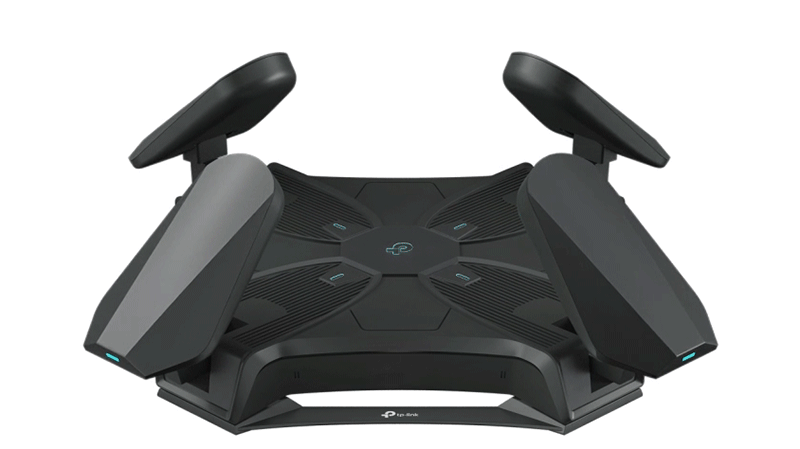
As fast as wireless network technology evolves and adapts to accommodate an ever-growing number of internet-connected devices in our homes, it always seems like we’re struggling to get the fastest connection to effectively game online or stream movies at 4K resolutions (soon 8K). For those not wanting to upgrade to a mesh router system, which could cost well above $US1,000 ($1,397), to take advantage of the new Wi-Fi 6E standard, TP-Link revealed an unorthodox new way to squeeze better performance out of a single access point with its new Archer AXE200 Omni.
The 6E-compatible wireless router not only includes four external adjustable antennas to help direct signals to specific parts of a home where they’re needed most, it makes those adjustments all by itself with motorised mechanisms that independently control the angle and orientation of each antenna. With internet-connected mobile devices like smartphones, tablets, laptops, and gaming devices often moving around a space, the Archer AXE200 Omni keeps track of where in a home the strongest signals are needed most, and continually adjusts the positions of its four antennas to ensure an optimal connection. — Andrew Liszewski
HyperX Cloud Alpha Wireless Headphones
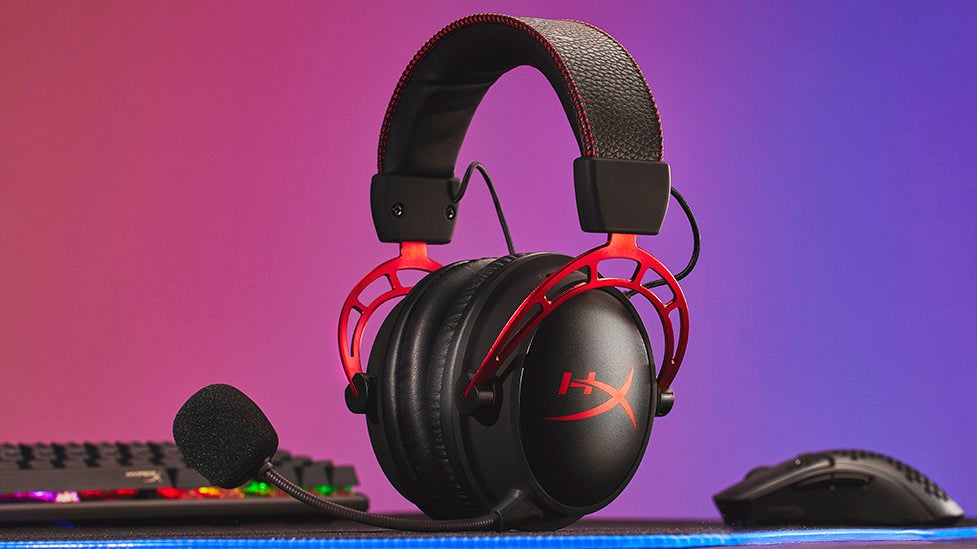
HyperX debuted a gaming headset that lasts for 300 hours on a single charge — need I say more? OK, so let me put that figure into perspective: almost every gaming headset you can buy today has double-digit runtimes aside from one or two that reach up to 100 hours. So when HyperX promised its $US200 ($279) Cloud Alpha Wireless headphones can last for nearly two weeks of continuous use, it got our attention.
Especially since the headset is said to be nearly identical to its wired counterpart in terms of sound quality and performance. It has the same basic design and the updated “Dual Chamber Technology” and 50mm drivers (with DTS:X) even helped slim down the profile of these cans.
To be clear, we haven’t tested the claim ourselves, but HyperX said the headset has a 1,500 mAh rechargeable lithium-polymer battery, and that the 300 hours claim at 50% volume was apparently verified by a “third-party testing company.” We’ll test these when they arrive in February to see if HyperX is bullshitting us or if the company really made a headset most people won’t need to be charged for months. — Phillip Tracy
Sony Vision-S 02 Prototype
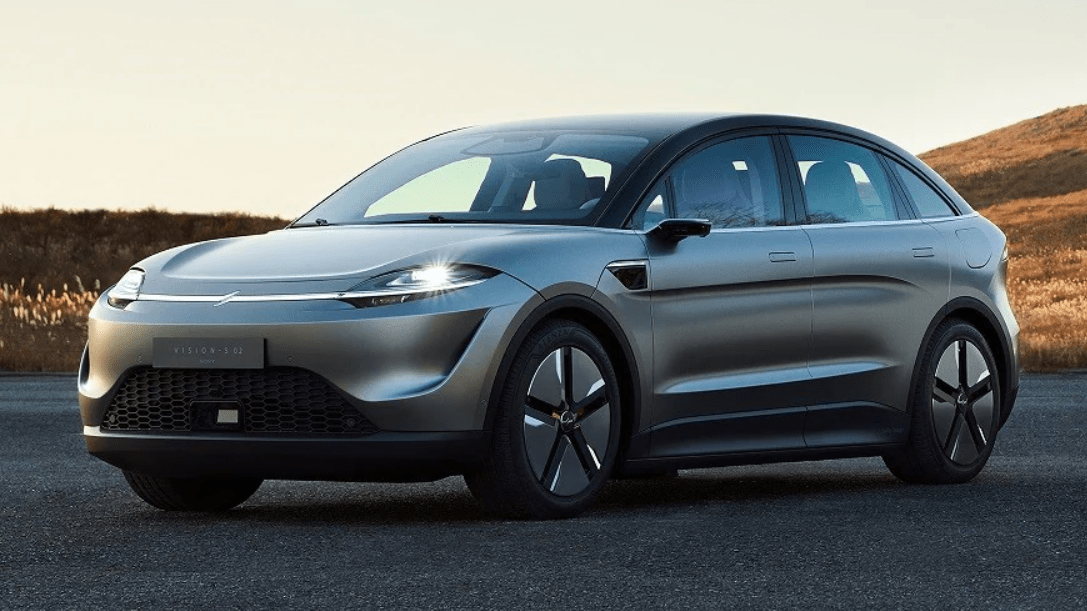
The transition to electric cars is shaking up the market, and while a lot of established automakers are trying to play catch-up, Sony’s new Vision-S 02 represents one of the first major ventures from an electronics maker into the EV space.
The Vision-S 02’s prototype tech looks sharp: There’s a slick three-screen digital dashboard, an additional haptic touchscreen, side mirror displays, built-in voice controls, individual seat speakers, sensors for autonomous parking, and more. Notably, unlike some other EV makers, Sony doesn’t seem to be setting its ambitions too high — the Vision-S 02 is only slated to support Level 2+ autonomous driving capabilities for now.
Sony also announced that it’s creating a new division, Sony Mobility, to develop future electric vehicles, so it’s clear the company isn’t just hyping some cool tech we’ll never actually see in the future. — Sam Rutherford
Samsung Home Hub
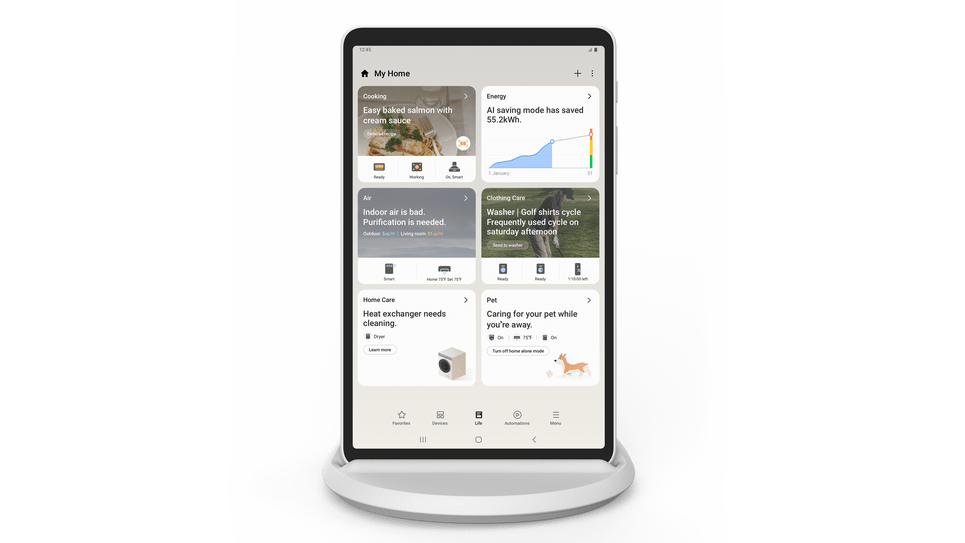
At a glance, the Samsung Home Hub seems like nothing more than an Android tablet with a home screen explicitly dedicated to managing your smart home. But that’s what the people want. Google and Amazon’s voice assistants are fine, but there’s nothing like manually flipping a (virtual switch) to turn the lights off and on without speaking. And unlike most tablets, which are for individual use, the Home Hub is a universal smart home remote for the whole house.
The Home Hub isn’t just a launcher for Samsung’s SmartThings app. You can use it to manage your household’s routines and check in with Samsung’s other services, like SmartThings Cooking and SmartThings Clothing Care. Air monitoring is also available, which is becoming more of a concern as the climate changes the atmosphere around us. If you have Samsung appliances, you can even use the Home Hub to check their energy use.
Samsung’s Home Hub will be available in Korea in March and globally after that. — Florence Ion
LG OLED EX

Out with the OLED, in with the OLED EX. LG debuted at CES 2022 the evolution of its leading screen technology — OLED EX — which promises to increase brightness by up to 30%, resolving one of the major shortcomings of past OLED panels. Moreover, the updated panel technology is said to improve picture accuracy and allow for smaller display bezels.
While the fundamental technology is the same — consisting of millions of individual self-lit pixels — EX introduces a pair of changes: the use of an isotope called deuterium and the integration of algorithmic image processing. Along with the visual enhancements it brings, EX will apparently allow LG to reduce the bezel size on 65-inch TVs from six millimetres down to four.
LG will start the year by outfitting its G2 flagship and mainstream C2 TVs with OLED Evo, the current tech, before bringing EX to every OLED TV manufactured at two of its manufacturing locations starting in the second quarter of next year. — Phillip Tracy
Anker Nebula Cosmos Laser 4K Projector

For around $US2,000 ($2,794) you can get yourself a 65-inch OLED 4K TV that will look absolutely beautiful mounted to a wall. But, if after two years of avoiding crowded spaces like movie theatres you’re finally ready to bring that experience home, for two grand you can also opt for Anker’s new Nebula Cosmos Laser 4K projector, which puts everything you need for a grandiose movie night experience in a portable package with its own convenient carrying handle.
With 2,400 ANSI lumens of brightness, the Nebula Cosmos may struggle with brightness and contrast when used indoors on a bright sunny day with the curtains wide open — an OLED will perform much better in those conditions. But even in a moderately dark space it will easily project a massive 150-inch image on a screen or wall letting you really see every last detail of a 4K image. For easy setup, the Nebula Cosmos both focuses all by itself and makes sure the projected image is perfectly square and level, while a pair of side-firing 30-watt speakers should easily fill a room, or a backyard, with satisfying sound. It even runs Android TV providing access to hundreds of streaming services, games, and media players — all you need to provide is wireless internet. — Andrew Liszewski
Asus ROG Flow Z13
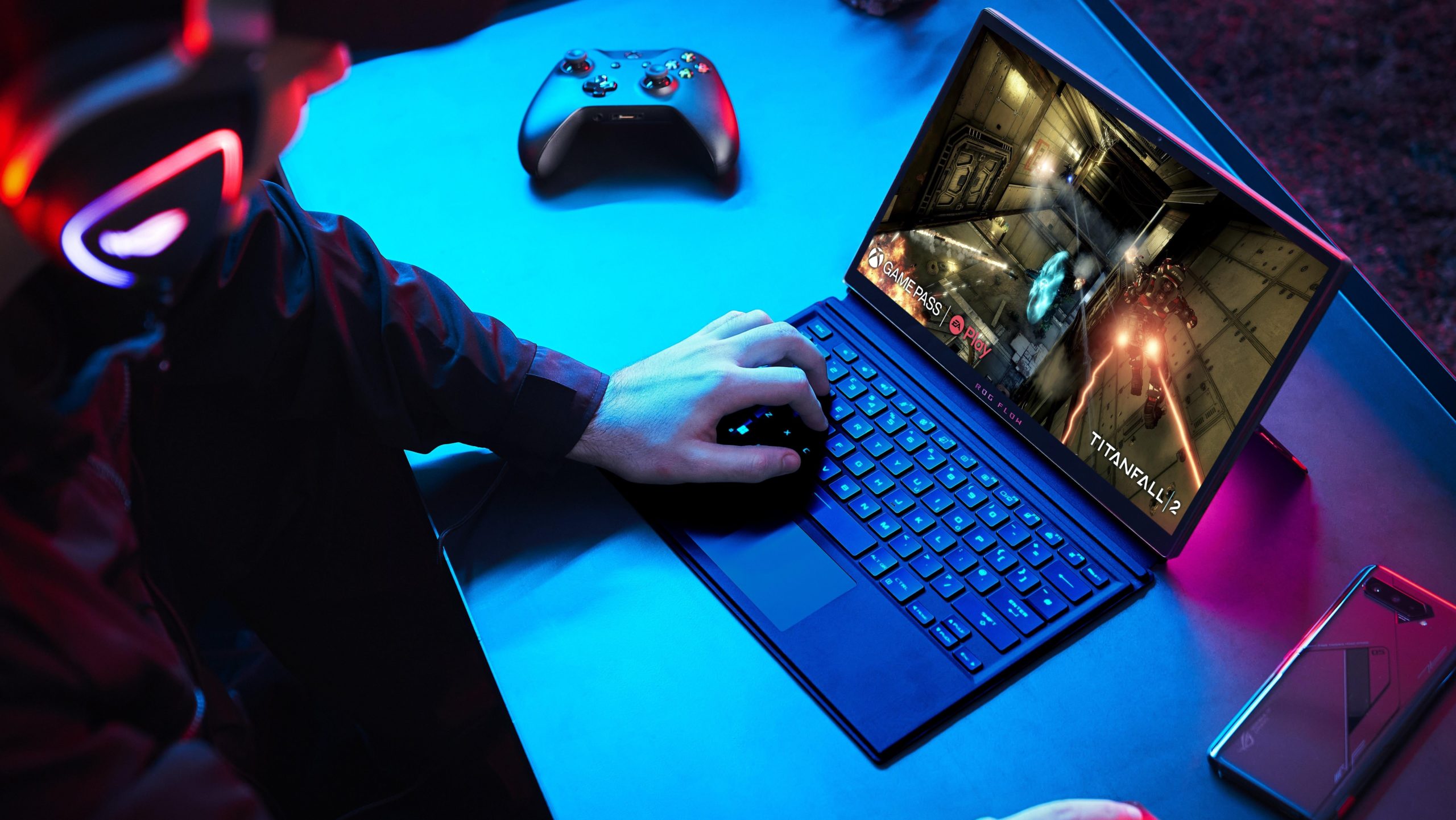
Imagine a Surface Pro but with the graphical chops to play the latest triple-A games. It’s the stuff of a PC gamer’s dreams, and Asus — which also debuted a 17-inch foldable PC and a dual-screen laptop at CES — turned it into reality. Building on the ROG Flow X13 unveiled at last year’s event, the Flow Z13 is a 13-inch tablet with specs you’d expect from a 17-inch gaming laptop, including an Intel Core i9-12900H CPU with an Nvidia RTX 3050 Ti GPU.
And because Asus is clearly a bit deranged, the company gave the Z13 a PCIe 3.0 x8 port so you can connect to its XG Mobile eGPU to harness the power of Nvidia’s GeForce RTX 3080 mobile GPU or AMD’s newly revealed Radeon RX 6850M XT GPU. Doing so turns this petite, 1 kg tablet into a gaming system capable of playing the latest games at Ultra graphics settings without breaking a sweat.
We don’t know how much the Z13 will cost when it arrives in Q1/Q2 of this year, but considering the eGPU alone goes for $US1,500 ($2,095), we can only assume most gamers will be priced out of one of the most enticing (at least on paper) PCs we’ve seen in a long time. — Phillip Tracy
Samsung Odyssey Ark
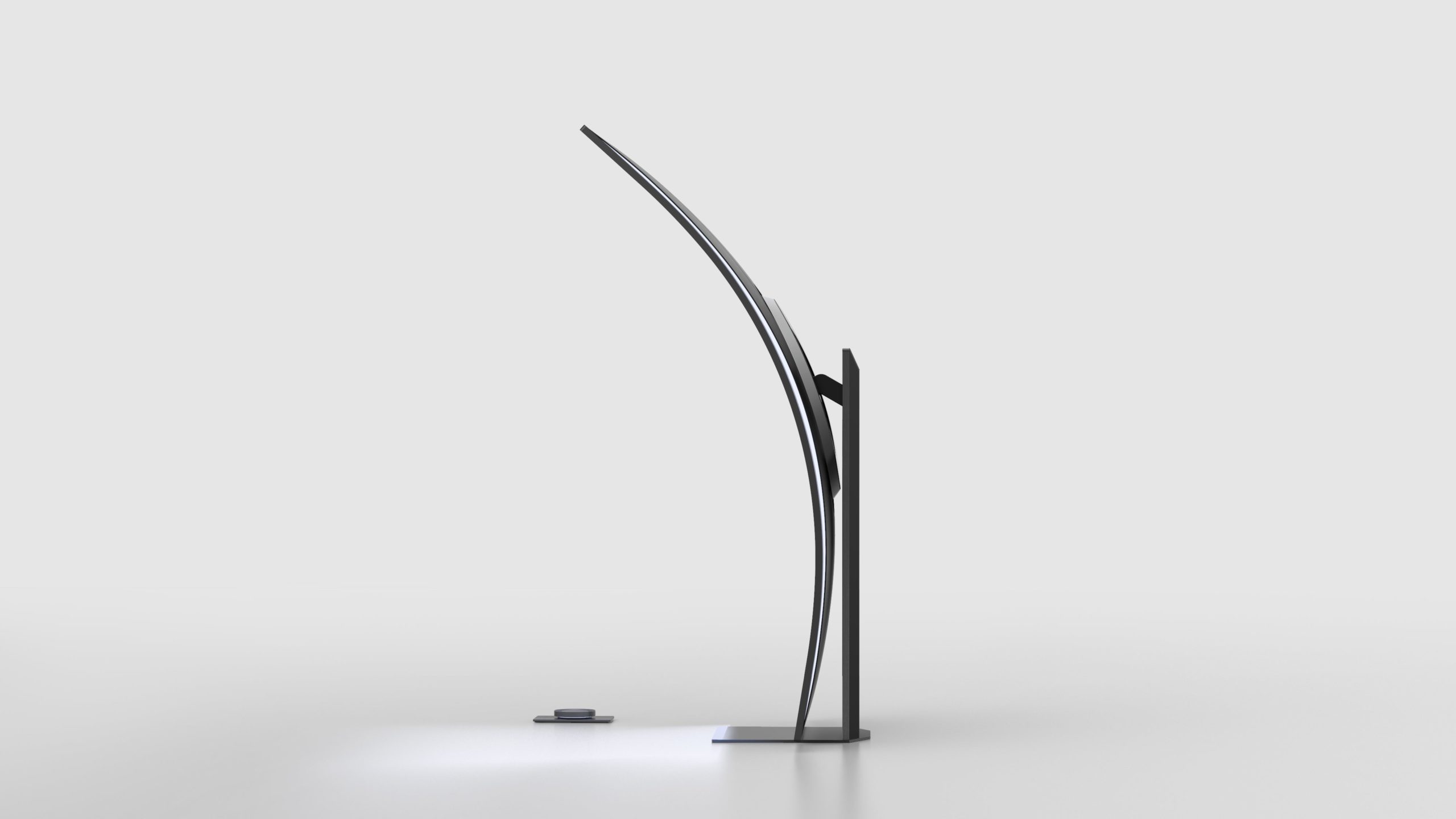
Samsung’s 55-inch Odyssey Ark stretches the definition of what most people would consider a personal “gaming screen,” but in a lot of ways, that’s what makes it so awesome.
Thanks to its 1000R curvature, the Ark can wrap around you to create a sort of digital cocoon, with a pivot option and height adjustability to transform the ARK into a huge vertical display. There’s also a handy wireless control dial for adjusting settings, which works with Samsung’s multi-view feature so you can cram multiple games or other windows onto the monitor at specific resolutions. And thanks to quantum dot tech and mini-LED backlighting, image quality should be great too.
The Ark might simply be the ultimate work-from-home/gaming screen, and while Samsung hasn’t released pricing yet, it’s a good bet that this thing won’t come cheap. — Sam Rutherford
Schlage Encode Plus

CES 2022 was all about the smart home, and we saw plenty of companies announce support for the upcoming Matter standard that will make all of your smart home stuff play nicely together. But one of the more interesting and useful devices announced was Schlage’s new smart lock, which is compatible with Apple’s Home Key feature in iOS 15.
The Schlage Encode Plus is as futuristic as it sounds. Once the deadbolt is installed and set up with Apple’s Home Key, you can walk up to your front door, tap your Apple Watch or iPhone to the smart lock, and then it just…opens. For added security, you can also choose to require Face ID, Touch ID, or a passcode on your iPhone to unlock the door. The lock also supports Power Reserve, so even if your iPhone is out of battery, you’ll be able to tap to unlock the door for up to five hours after it dies. If you don’t have your phone or watch on hand, you can enter a PIN on the Encode Plus to get into the house instead. This is the sort of simplicity we dream of when we think about the ideal smart home, and we can’t wait to test it out. — Florence Ion
Intel 12th-Gen H-Series Laptop CPUs
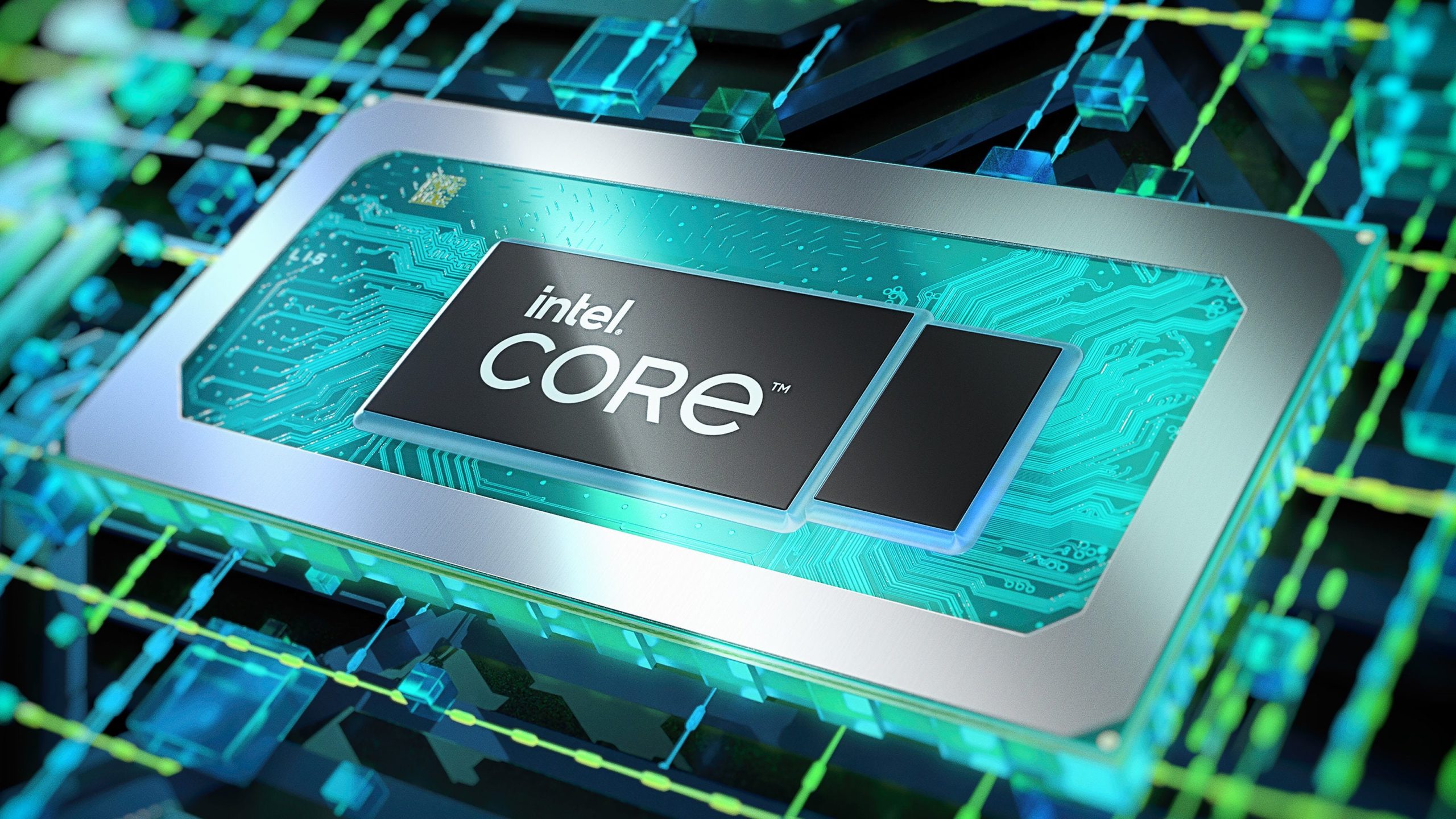
There was no chip shortage at CES where Intel, AMD, and Nvidia released new versions of its processors and graphics cards — components set to power the next wave of laptops and desktops.
Intel made some bold pitches, calling its 12th-gen chip the “the fastest mobile processor,” and while we wouldn’t put much stake into those claims until we can test the chips ourselves, the benchmarks it shared are encouraging. The chipmaker highlighted the flagship Core i9-12900HK SKU with its 5.0GHz clock speed — claiming the chip is faster than AMD’s Ryzen 5900HX and Apple’s M1 Max. Its in-house benchmarks claim up to a 28% increase in gaming performance and up to a 44% boost on certain productivity apps.
Intel’s 12th-gen CPUs also bring new technologies to the next fleet of gaming and high-end laptops, including DDR5 RAM, PCIe 4.0, Wi-Fi 6E, and Thunderbolt 4. If you’re buying a laptop this year, get excited. — Phillip Tracy
Alienware QD-OLED Monitor

We expected Samsung to hype QD-OLED — the company’s answer to LG OLED — by bringing a fleet of new TVs to CES 2022, but instead, Sony released a flagship QD-OLED TV, and perhaps even more surprisingly, Alienware outfitted a 34-inch monitor with the long-awaited technology.
Alienware’s 34-inch AW3423DW monitor uses a QD-OLED (quantum dot organic light-emitting diode), which blends the perfect blacks and infinite contrast of OLED with vivid colours of quantum dot LED technology.
This 34-inch, 3440 x 1400 display with a 175Hz refresh rate and 0.1-millisecond response time is said to cover 99.3% DCI-P3 colour coverage and score a Delta-E colour accuracy of below 2.0. Even more impressive is its maximum brightness of 1,000 nits, though I don’t know too many people who like staring at the sun.
Alienware didn’t disclose pricing perhaps because it doesn’t want to scare people away — you can safely assume this monitor will put a hole through your wallet when it ships on March 29. — Phillip Tracy
Samsung Eco Remote
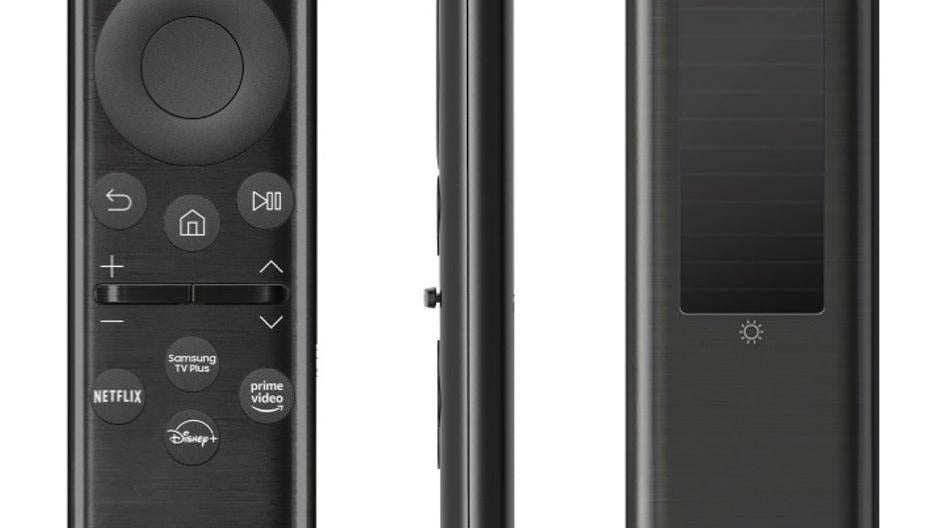
A remote that never requires you to change the batteries — what kind of utopian vision of the future is this? Apparently, it’s Samsung’s, given that the company took CES 2022 as an opportunity to introduce its new-and-improved Eco Remote, which is made from recycled materials and utilises the power emitted by the radio waves that come from wifi routers in order to self-sufficiently charge.
Samsung has been trumpeting its desire to switch to more sustainable materials since at least 2019, when the company announced that it would abandon most of its plastic packaging in favour of more sustainable options. The Eco Remote builds on that commitment, in that it ditches the need for a lithium-ion battery and works by siphoning off the radio frequency signals emitted by your wifi router that would have otherwise gone to waste. Like the previous iteration of the Eco Remote, the updated version is also capable of charging via solar power, but the newly-added RF harvesting capabilities should give it an extra boost. According to Samsung, the new remotes — which will ship out automatically with all of Samsung’s 2022 QLED 4K and 8K TVs — could eventually prevent 99 million AAA batteries from being dumped in landfills over the next seven years. Not bad, for something small enough to fit in the palm of your hand. — Brianna Provenzano
